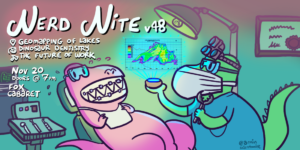Hold onto your butts everyone because we’re back with a stellar lineup of talks about dinosaur dentition, post-prison consultation, and lake sonar mapping on November 20th. Fun fact: on this same day in 1889, Edwin Hubble was born. Hubble contributed to the Hubble-Lamaitre Law that implies that the universe is expanding (EXPANDING INTO WHAT screams Kaylee) and discovered that all those clouds of space dust were actually galaxies past the Milky Way. And while Hubble has a NASA telescope named after him, and his birthdate is listed in “Celebrity Birthdays on November 20th”, someone who receives far less attention (and who is not famously known as an asshole) is Henrietta Leavitt. Leavitt has been described as “the woman who gave us a universal ruler” and whose work was foundational to Hubble’s discovery of galaxies. While working as one of many data-crunching “computers” at Harvard University, she also used star brightness and variability of that brightness to determine a star’s distance from earth. It’s her observation and calculations which allowed us to convert our view of the night sky from 2D to 3D. So, this Nerd Nite, let’s raise a glass (or two) to a woman whose work was largely overlooked, learn about other novel work being done across disciplines, and take an extra moment or two to look up at the stars.
Hosted by: Kaylee Byers and Michael Unger
When: Wednesday November 20th; Doors @ 7, show starts @ 7:30
Poster by: Armin Mortazavi
Music by: DJ Birthday

Beyond the Shallows: Bathymetric Mapping in the Sea to Sky
Dr. Steve Quane
When visiting some of the most spectacular places in the Sea to Sky region, modern Instagram culture tends to both figuratively and literally stop near the water’s edge. The local, blue and green glacial lakes are transfixing in their surficial beauty, inviting thought and contemplation about the natural spaces they comprise. Nonetheless, many hikers at these magical geological places find themselves battling overcrowded parking lots and hiking many kilometers on overwhelmed, trash-littered trails, only to snap a picture on an over-photographed log before scurrying back to phone service to hit “share” on their post-worthy adventure. Certainly, these lakes must posses something deeper and more meaningful beneath the surface? I will present my work on sonar mapping the bathymetry of a few local celebrity lakes and perhaps over-pontificate on whether a deeper understanding of the natural world can help us curate a local landscape under siege.
Bio: Steve has a PhD from the University of British Columbia where he studied experimental volcanology. After a three-year teaching gig at Colorado College, Steve washed up as a Geology Professor at Quest University in Squamish. An avid volcano enthusiast, Steve has been researching the formation of and resulting natural hazards created by the stunning glacio-volcanic landscapes in the Sea to Sky region. He is also a founding member of the Sea to Sky Fire and Ice GeoPark Steering Committee. Steve will likely be the only local running the trails towards, and skiing the slopes of, Mt. Garibaldi during its next eruption.
Dinosaur Dentistry
Dr. Kirsten Brink
One of the most impressive features of dinosaurs are their vicious-looking teeth. In this presentation, Kirstin blends together her knowledge of the fossil record of dinosaurs and her current research in dentistry to address the age-old question: Did dinosaurs get dental cavities? Join her on a journey to understand how we interpret dinosaur diets from fossil remains, how dinosaur teeth compare to human teeth, and the importance of flossing.
Bio: Kirstin received her PhD in vertebrate palaeontology from the University of Toronto. She is currently working as a Banting Postdoctoral Fellow in the Faculty of Dentistry at UBC, studying the evolution and development of lizard teeth. When not in the lab, you can find Kirstin holding a glass of wine or holding binoculars and staring at birds.
Experts Behind Bars: What Former Prisoners Can Teach Us About the Future of Work
Dr. Ray Hsu
When I first learned about former prisoners becoming consultants for white collar criminals who were entering prison, I had been teaching writing in prisons for the better part of three years. I was also on the verge of becoming a professor and I was already having doubt about the role of the university in a grander scheme of things. And I wasn’t alone: on online communities where academics gathered, I was noticing people abuzz about consulting as a path beyond academia. As more and more people flee the constraints of organizations–academic, corporate, institutional–the more the ranks of “consultants” grow.
In this talk, I argue that “consulting” is an emergent and rapidly growing category that is both legible and within reach for conceptual weaponization against the prison–university–industrial complex. What, I ask, can post-prison consulting teach us about the nature of expert knowledge labour beyond institutions and the potential for a class consciousness that is both enabled by capitalism and, potentially, aimed to “disrupt” it?
Bio: Dr. Ray Hsu is cofounder of Foxlab (foxlab.ca), where empowers consultants to build out their expertise into expert businesses. He is also author of two award-winning books of poetry and served as Faculty Supervisor of the UBC Emerging Media Lab, where he worked on virtual reality, augmented reality and mixed reality. He has taught creative practice at the Banff Centre, SFU’s The Writers Studio, UBC’s Creative Writing program, as well as in a United States prison, where he taught for the better part of three years.
